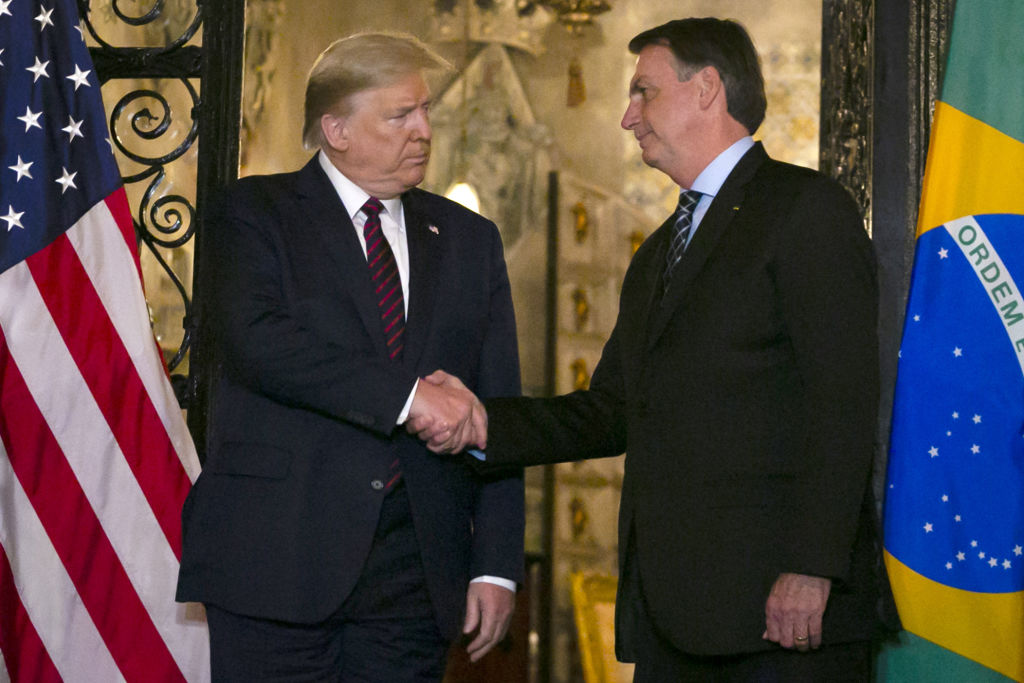
On July 9, President Donald Trump announced that starting August 1, the U.S. would apply a 50% tariff on all goods from Brazil for its treatment of former President Jair Bolsonaro, who is on trial for allegedly attempting a coup after his 2022 election loss.
“This Trial should not be taking place,” Trump wrote in the letter posted on his platform Truth Social. “It is a Witch Hunt that should end IMMEDIATELY!” The 50% tariff is a substantial escalation from the 10% tariff that Trump assigned to Brazil during his April 2 “Liberation Day” announcement.
Responding to Trump’s decision, Brazilian President Luiz Inácio Lula da Silva said in a social media post that the tariffs would trigger the country’s Economic Reciprocity Law. The legislation allows trade, investment, and intellectual property agreements to be suspended when countries involved harm Brazil’s competitiveness. “Brazil is a sovereign nation with independent institutions and will not accept any form of tutelage,” Lula said.
Lula added that the “judicial proceedings against those responsible for planning the coup d’état fall exclusively under the jurisdiction of Brazil’s Judicial Branch.”
AQ asked analysts to share their reactions and perspectives.

Fernanda Magnotta
Magnotta is a senior fellow at the Brazilian Center for International Relations
President Donald Trump’s decision to impose new tariffs on Brazil may not surprise those familiar with his foreign policy style. However, it still sends a strong—and unsettling—signal. It demonstrates a willingness to use economic tools for political gain, even if it risks harming long-standing alliances. While it aligns with Trump’s transactional approach to international relations, the move has wider consequences that extend beyond trade.
While it’s understandable that the U.S. would respond to shifts in global alignment, punitive measures against a longstanding partner can backfire. In Brazil’s case, the domestic political effects are unpredictable, and might include bolstering President Lula’s position both at home and abroad. Instead of isolating ideological adversaries, Washington could unintentionally empower them, creating a situation where external pressure brings domestic forces together rather than pushes them apart.
The decision sends a troubling message about the stability and predictability of doing business with the U.S. Historically, the U.S. trade surplus with Brazil, along with its role as a reliable partner in key sectors, such as agriculture and aviation, has served as a cornerstone in the bilateral relationship. This recent move puts those foundations at risk. It raises what many in the region might call the “U.S. risk premium,” and could alienate productive sectors that have traditionally favored deeper ties with Washington. When economic engagement becomes subject to sudden political shifts, trust erodes and with it, the very leverage the U.S. seeks to maintain.
These developments underscore the strategic rationale for countries like Brazil to pursue risk diversification. Rather than being pulled into one orbit, many emerging powers are seeking to balance relationships across multiple axes, not to antagonize the West, but to hedge against volatility. By acting in this way, Washington may be accelerating the push toward multipolarity, not containing it. In this sense, the tariffs are not just a bilateral issue: They are part of a larger recalibration of the global order, in which flexibility, trust, and mutual respect will be the most valuable currencies.

Oliver Stuenkel
Stuenkel is a Visiting Scholar at the Carnegie Endowment for International Peace in Washington
Trump has announced a 50% tariff on Brazilian goods, accusing Brazil of persecuting his ally Jair Bolsonaro and censoring U.S. social media platforms. This sharp escalation—from a previously planned 10% tariff—marks the first direct threat to Brazil since Trump returned to office.
While Brazil wasn’t among the first countries targeted by Trump’s new round of tariffs—partly because the U.S. runs a significant trade surplus with Brazil—it was always a matter of when, not if. Brazilian officials knew the country could remain under Trump’s radar only for so long. Given the ideological divergence with Lula and his growing global visibility, it was likely that Trump would eventually lash out.
There is a palpable sense of hostility among U.S. government officials in Washington vis-à-vis the Lula government. Still, it’s worth remembering: Trump also threatened tariffs on Brazilian steel back in 2019—when Bolsonaro, his ideological ally, was in power. So this isn’t just about ideology or political alignment. It’s also about Trump’s broader willingness to use trade as a geopolitical weapon.
Trump claims Brazil is conducting a “witch hunt” against Bolsonaro, who is currently on trial for allegedly plotting a coup to stay in power. He also argues that the tariffs are a response to “attacks on Free Speech Rights of Americans”—a reference to Brazil’s stricter content moderation policies, which have frustrated U.S. tech companies. To justify the move, Trump is invoking Section 301—a trade tool designed to counter unfair commercial practices—to punish Brazil over its internal judicial process.
This is highly unusual, and represents a sharp politicization of trade enforcement. If Lula opts for a firm but measured defense of Brazil’s sovereignty, he could generate a rally-around-the-flag effect and even expand his domestic support—including among moderates and centrists. Historically, overt foreign interference tends to be poorly received in Brazil.
Even critics of Lula may view Trump’s move as an unacceptable intrusion into the country’s democratic institutions and legal system. The political ramifications are substantial. If Lula plays this well—and manages to portray the Bolsonaro family, who likely encouraged Trump to act, as fundamentally unpatriotic and working against Brazil’s interests—his chances of reelection next year may have just grown considerably. From a trade perspective, a 50% tariff would harm key Brazilian exports.
But the diplomatic fallout may be even more damaging: This move deepens mistrust and could strain U.S.-Brazil relations for years to come. Even if the tariff is never actually implemented, the episode is a major setback for those in both countries who have worked to strengthen bilateral ties.

Alessandra Ribeiro
Ribeiro is Partner and Director of Macroeconomics and Sectoral Analysis at Tendências Consultoria in São Paulo
The Trump administration imposed a 50% tariff on all Brazilian exports to the United States, a decision made public in a letter signed by the U.S. president. The main justification for the decision is political in nature and has two components: the situation involving former President Bolsonaro and actions of the Brazilian Supreme Court against American companies.
From an economic standpoint, the letter indicated that trade policy between Brazil and the U.S. is harmful to the latter, which is inaccurate, given the consistent trade surpluses the U.S. has had with Brazil since 2009.
Considering the political motivations behind the decision, the room for negotiation regarding the new tariffs is highly uncertain. We assess that there will be only limited space for negotiation initially, with the possibility that talks could open up over time as adverse economic repercussions emerge for the American economy.
The U.S. government’s decision will likely have significant effects on specific sectors of Brazil’s economy, although the impact on the overall economy is limited. Among the products exported to the U.S., those most negatively affected are the following:
a) Steel;
b) Aircraft and parts, notably Embraer’s exports;
c) Capital goods, the U.S. is the main destination for Brazil’s machinery exports (especially machinery for the energy sector); and
d) Agricultural products, particularly coffee and orange juice.
Brazil is a significant supplier to the U.S. market of many of these key products. Considering the limited ability to quickly substitute with imports from other countries or domestic production, the most likely effect of Trump’s policy will be a rise in prices in the U.S. market that will lead to reduced demand and hurt Brazilian exports.
For products already subject to specific tariffs, such as semi-finished goods, which had already been assigned a 50% tariff, there is still uncertainty as to whether they will face additional tariffs following this announcement.
In summary, the tariffs will have important sectoral impacts in the Brazilian economy, though the overall effect on the aggregate economy is limited. This situation should reinforce for Brazil the importance of diversifying its export markets and advancing trade agreements with other regions like Europe and Asia. This strategy would mitigate adverse effects over time, both in terms of market access for Brazilian products and sources of foreign investment.

Brian Winter
Contributing editor, Americas Quarterly
I don’t see an easy way out of this confrontation. Trump’s previous battles with Presidents Gustavo Petro, Claudia Sheinbaum, and José Raúl Mulino de-escalated relatively quickly, but those are countries with very U.S.-connected economies and security relationships—and therefore incentives to seek quick accommodations. Not nearly as true for Brazil.
Much of Brazil’s establishment sees the Bolsonaro trial as an existential battle for democracy, and there is no path to dropping the case as Trump is demanding. Lula’s approval has been trending down, and he may welcome a fight with nationalist overtones. Order a sandwich, this could take a while.





